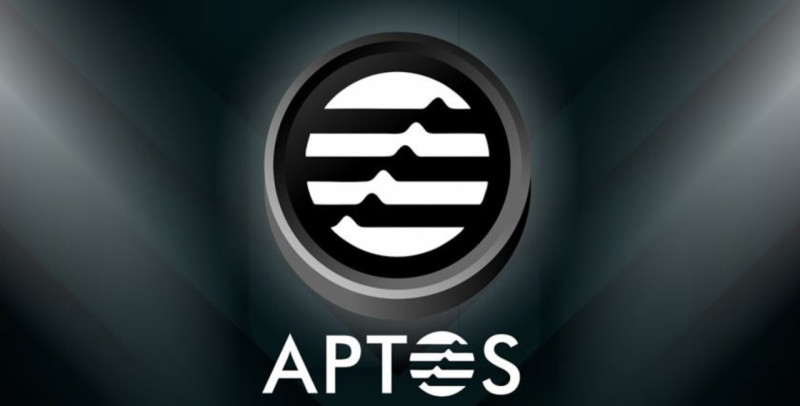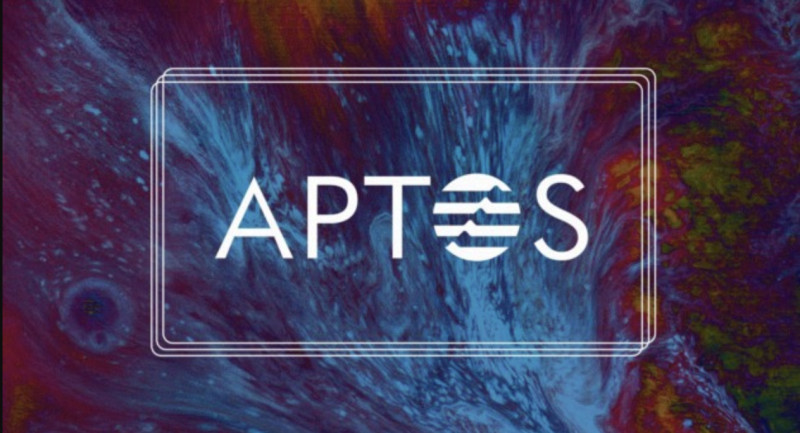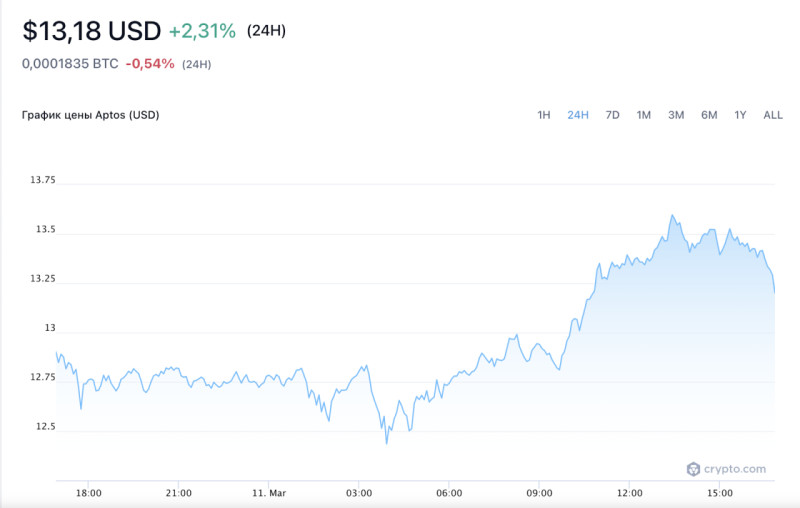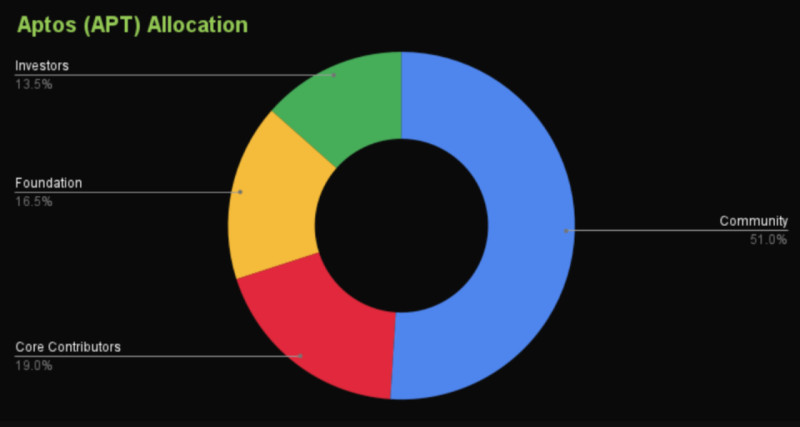
The Aptos blockchain was launched not so long ago, in autumn 2022. But its start was head-spinning, creating a buzz in the crypto realm.
Aptos was dubbed Solana's killer thanks to its breakthrough scaling solutions. However, some skeptics felt that the hype around this new project was overblown. In fact, Aptos was heavily promoted.
However, these controversial views and harsh criticisms did not stop Aptos from gaining a lot of attention from the wider crypto community. Today, this blockchain has a large army of supporters.
This article explores the features of the Aptos network, its mission to create a secure, scalable and upgradable Web3 infrastructure, and the characteristics of its native token. Also, it explains how you can make money with APT token and what prospects for the development of this new ecosystem are.
Features of the Aptos blockchain

Aptos cryptocurrency made its debut on October 18, 2022, amidst an unprecedented wave of excitement within the cryptocurrency community.
At its inception, Aptos traded at a mere 1 USDT, but following its listing on the Binance crypto exchange, the value of the Aptos token (APT) skyrocketed by an astonishing 10,000%.
The project's launch occurred during a challenging period in the crypto industry, amid a prevailing bearish trend. Introducing a new cryptocurrency for trading and unveiling new trading pairs during such a downturn presents significant risks. However, credit is due to the creators of the Aptos project, who orchestrated an extensive marketing campaign, effectively raising awareness among a large segment of crypto enthusiasts prior to its launch, thus ensuring its success.
The Aptos project represents a layer 1 blockchain designed to facilitate the mass adoption of Web 3.0 and to enhance the capabilities of decentralized application networks.
Key tenets of the project include scalability, security, reliability, and upgradability.
Distinguishing itself, the Aptos blockchain incorporates technology for parallel transaction execution, known as "Parallel Execution." This innovation accelerates blockchain throughput, thereby enhancing transaction speeds across various applications.
At the helm of this endeavor are Mo Sheikh and Avery Ching. Notably, both are former Meta Corporation employees boasting extensive experience in Web3 development.
Mohammad Sheikh, an entrepreneur with over a decade of experience in cryptography and blockchain, previously served as head of strategic promotion at ConsenSys and co-founded Meridio, a software development firm.
Avery Ching, a seasoned technical engineer, led the development of Facebook's Novi digital wallet and contributed to Yahoo's search engine.
The Aptos development team, comprising over 350 individuals, boasts a wealth of experience. Drawing talent from defunct initiatives like Diem, the team includes adept designers, engineers, and strategists well-versed in the Move programming language and Bullshark mechanisms.
In essence, the Aptos project is not merely the brainchild of enthusiasts but a collaboration of seasoned professionals with illustrious track records.
Over a span of three years, the collective effort of the team culminated in the development of a robust ecosystem for the Aptos project.
The overarching objective of the project is to revolutionize the first-tier space through innovative consensus mechanisms, redesigned smart contracts, robust security measures, high performance, and decentralization.
Ultimately, the Aptos blockchain aspires to emulate the cloud infrastructure of Web 2.0 in a decentralized format, paving the way for rapid adoption of Web 3.0 within the virtual landscape.
Utilizing the Move programming language, Aptos ensures swift and secure money transfers. Technical documentation underscores the efficacy of the smart contract verifier in safeguarding programs against malware and cyber-attacks.
Furthermore, Aptos offers users diverse key storage and management options. With near-complete transparency in transactions and pragmatic client protocols, Aptos promises a secure and reliable user experience.
The foundation of the Aptos ecosystem is built upon several key components:
1. Native Move Integration: By incorporating the Move programming language and parallel execution technology, the blockchain achieves an impressive transaction processing capability of 160 thousand transactions per second (TPS).
2. Flexible Key Management and Hybrid Storage Options: Aptos offers users adaptable key management solutions and innovative storage choices, ensuring a secure and reliable user experience.
3. Modular Transaction Processing: Through parallel operation, Aptos enables modular transaction processing, including transaction distribution, block execution order, batch storage, and registry certification. This architecture enhances throughput and facilitates frequent and instantaneous updates.
These intricate concepts address the fundamental challenges of decentralized networks—decentralization, security, and scalability. The primary objective of Aptos is to maximize the implementation of Web 3.0 across a diverse array of enterprises.
Upon its introduction into the crypto space, Aptos garnered attention as a potential contender to projects like Solana and even Bitcoin, owing to its significant transaction processing speed. While Solana processes 50 thousand transactions per second, Aptos demonstrates similar prowess, earning it the moniker "Solana killer."
However, Aptos also attracted controversy, particularly regarding its tokenomics. Criticism focused on the perceived unreliability of its distribution model, which saw an increase in circulating coins from 1 billion to 1.5 billion by 2031. This distribution allocated a significant portion to ecosystem community members, with whales dominating a substantial share.
The network design, with 82% of tokens staked, raised doubts among users, who questioned the fairness and trustworthiness of the ecosystem. Despite these concerns, major exchanges swiftly listed the APT token, signaling caution to users about potential volatility.
Despite initial skepticism, Aptos cryptocurrency gained popularity, offering early investors substantial returns, with some turning modest investments into significant profits. Notably, users capitalized on the opportunity to obtain free NFTs during the project's testnet phase.
Aptos network's launch on October 12, 2022, and subsequent AirDrop of APT coins on October 19 attracted significant interest, with over 20 million coins distributed to 110 thousand users, underscoring the remarkable demand for the nascent cryptocurrency.
Who invest in Aptos?

Significant attention from prominent investors quickly turned towards the Aptos project, prompting multimillion-dollar investments into its network development.
In July 2022, the project successfully secured a $150 million funding round, drawing support from renowned entities such as FTX Ventures, Jump Crypto, Griffin Gaming Partners, and Circle Ventures, among others.
Building on this momentum, March of the same year saw another substantial infusion of $200 million into the project. Notable contributors included a16z, Tiger Global, Binance Labs, Multicoin Capital, and several other influential entities.
With a cumulative investment of $350 million in 2022 alone, Aptos solidified its financial standing.
Furthermore, in mid-September, Binance Labs announced further investments in Aptos, aiming to expedite the ecosystem's industry-wide adoption.
Notably, Aptos boasts a robust community, with over 300 thousand followers on Twitter and more than 10 thousand active participants on platforms like Medium and Github, underscoring its widespread appeal and engagement.
Applications and services operating on Aptos

Following the launch of the Aptos network, developers wasted no time in rolling out a suite of applications tailored to this innovative blockchain.
The inaugural release, Petra Wallet, debuted as a free web application resembling a Google Chrome extension. It empowers users to securely store and transfer digital assets, engage in NFT development and exploration, and seamlessly interact with decentralized applications native to the Aptos network.
On October 19, 2022, the Aptos Name Service (ANS) was unveiled, offering users the convenience of associating a user-friendly .apt extension with their Aptos wallet address, simplifying the otherwise complex process of public key management.
Presently operational, the Aptos Explorer application furnishes users with comprehensive blockchain visibility. Users can effortlessly track transactions, monitor blocks, and observe validator activities across the main network.
Moreover, the LayerZero crypto protocol introduced the Aptos Internet Bridge, facilitating seamless transfer of cryptocurrencies such as USDC, USDT, and ETH from blockchains like Ethereum and BNB Chain to the Aptos network.
Simultaneously with the main network, the NFT marketplace Topaz was inaugurated, serving as a dedicated platform for trading non-fungible tokens exclusively on the Aptos blockchain.
Why is Aptos so popular?
In the realm of blockchain technology, continual advancement stands as a cornerstone. In the cryptocurrency industry, the primary focus of new projects often revolves around the agility to swiftly adapt and update their networks. Aptos emerges as a frontrunner in this aspect, boasting a resilient infrastructure designed to embrace change effectively.
This adaptability renders Aptos a versatile platform, suitable for developing a myriad of applications, including games, NFTs, and social networks.
Moreover, the developers of the Aptos project are committed to addressing three core challenges prevalent in blockchain technology: maintaining decentralization, ensuring reliability, and achieving scalability. Amidst the global push for regulatory frameworks in the crypto sphere, the issue of decentralization takes center stage, with reliability and scalability closely following suit. Notably, not all existing projects successfully navigate these challenges.
Vitalik Buterin, the founder of Ethereum, acknowledged the complexity of simultaneously tackling all three issues, conceding that Ethereum currently lacks a comprehensive solution. While Ethereum remains decentralized and dependable, its scalability falls short. Aptos, on the other hand, shines in comparison, notably excelling in scalability while upholding decentralization and reliability.
Aptos cryptocurrency

The native token of the Aptos project is Aptos cryptocurrency, denoted by the ticker APT. Prior to the ecosystem's launch, developers maintained a veil of secrecy surrounding the token, eliciting skepticism within the crypto community. However, in response to the negative feedback, the project team swiftly unveiled a comprehensive description of the cryptocurrency's tokenomics on their official blog.
On October 19, 2022, the Aptos Foundation developers initiated an AirDrop of APT tokens, distributing over 20 million coins among 110 thousand users as per their announcement.
Trading of the newly minted digital asset commenced on major cryptocurrency exchanges including Binance, Huobi, Coinbase, and OKX. These platforms offered both spot and margin trading pairs with Bitcoin and various stablecoins.
Despite minimal promotional efforts from the exchanges, the Aptos cryptocurrency experienced a surge in its initial price upon listing, peaking at $59 within the first minute of trading before gradually stabilizing. Subsequently, its price hovered between $7 to $9 for an extended period.
At the time of writing, Aptos was valued at $13.18, with a daily trading volume of $260.78 million. Over the past 24 hours, the APT coin has experienced a modest increase of +2.31%. The circulating supply of APT tokens currently stands at 369.19 million.

The market capitalization of the asset is $4.71 billion with a daily trading volume of $600 million. Aptos cryptocurrency currently ranks 28th in the CoinGecko rating for this indicator. The market capitalization is calculated as follows: the price of APT tokens is multiplied by their number currently in circulation.
The initial volume of coins on the market was 1 billion, which was distributed as follows:
- project community – 51.02%
- key investors – 19.00%
- fund – 16.50%
- other investors – 13.48%

Let's delve deeper into the coin distribution plan tailored for both the community and the Aptos Foundation. This allocation aims to fuel ecosystem growth through grants, incentives, and various developmental initiatives. Notably, a portion of these tokens has already been earmarked exclusively for projects leveraging the Aptos protocol, with disbursement contingent upon project milestones.
The lion's share of tokens, totaling 410,217,359,767, is allocated to the Aptos Foundation, while a smaller portion of 100,000,000 tokens is designated for Aptos Labs. It's projected that all these tokens will be distributed over the course of the next decade post-launch.
Specifically:
- 125,000,000 APT tokens are available from the onset to bolster ecosystem projects, grants, and initiatives aimed at fostering network development both presently and in the future.
- Additionally, 5,000,000 APT tokens are available upfront to support various Aptos Foundation initiatives.
Moreover, a fractional share of the remaining coins, distributed at a rate of 1/120 monthly over ten years, is allocated to the network community and the fund.
Tokens intended for investors and significant depositors are subject to a four-year lock-up period, with the exception of user rewards for staking. Token unlocking follows a structured timeline:
- No APT tokens were available for the first 12 months post-cryptocurrency launch.
- From the 13th to the 18th month, 3/48 tokens were unlocked each month.
- Subsequently, from the 19th month onwards, 1/48 tokens are unlocked monthly.
It turns out that all APT tokens are unlocked 4 years after the launch of the network.
You can earn money with Aptos cryptocurrency in the following classic ways:
- trading
- investment
- staking
Once customers have placed their bets, they are issued a Tortuga Staked Aptos, which can be locked in the landing page and exchanged. You can also buy NFTs.
Challenges within the Aptos ecosystem
The Aptos project has stirred considerable controversy, with experts highlighting numerous shortcomings within its network. Chief among these concerns is the contentious nature of its tokenomics.
A significant portion of the token supply is allocated for the project's community, yet developers have been reluctant to elucidate the rationale behind this distribution strategy. This lack of transparency has left experienced investors wary, casting doubt on the project's legitimacy.
Moreover, despite its relative youth, Aptos fails to introduce any groundbreaking solutions or innovative concepts to the crypto landscape. Consequently, it struggles to distinguish itself from existing projects, offering little in terms of novelty or differentiation. The expansive airdrop program initiated at the project's outset led to a flurry of selling activity within minutes of trading commencement.
Crypto exchanges facilitating the trading of Aptos' native token adopted a rudimentary approach, failing to provide comprehensive details about the new cryptocurrency. Their approach seemed simplistic: "Here's a new token, buy it if you wish." Such a lackluster launch paved the way for manipulative practices during the initial trading phase, potentially casting a shadow over the cryptocurrency's future prospects.
Prospects for the Aptos Project
Aptos emerges as a blockchain poised to address the fundamental challenges encountered by prominent level 1 networks like Bitcoin and Ethereum: decentralization, security, and scalability. As such, it garners attention from Web 3.0 developers and enthusiasts seeking to enhance decentralized application ecosystems.
Furthermore, Aptos has garnered significant attention as one of the most heavily promoted startups within the crypto industry. While commendable marketing efforts have propelled its initial ascent, the project's offerings and solutions, while intriguing, have yet to present groundbreaking innovations to the crypto space.
However, Aptos faces stiff competition from a plethora of rivals also prioritizing flexibility, network scalability, and transaction speed. Notable competitors such as Solana, Cardano, Polygon, Avalanche, Fantom, and Algorand pursue similar objectives of creating secure, reliable, and fast decentralized blockchains. It remains to be seen whether Aptos can maintain pace with its competitors and actively evolve in this dynamic landscape. Only time will reveal the project's trajectory amidst this competitive milieu.









 Back to articles
Back to articles















